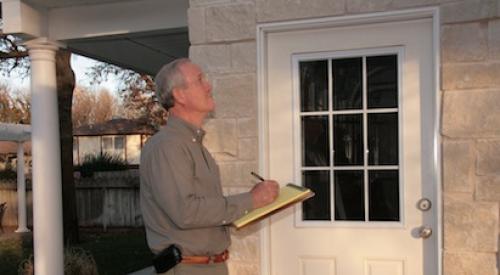| Engle Homes Phoenix supers meet with framers, plumbers and electricians to discuss job handoff improvement goals. |
Ask workers in any trade crew on a housing job site, and you’re likely to discover that the previous trades often make their lives miserable. Mark Upton, president of Engle Homes’ Phoenix division, did just that. “When you go out there, what you find is often ugly. Just walk around, and you’ll see enormous opportunities for improvement, especially in the handoffs from one trade to the next.”
Now Engle uses Job Ready/Job Complete, a Web-based technology developed by Southern California-based consultant Steve McGee. The system helped find the glitches in those handoffs, improve communication among the trades and measure progress in improving the construction process to a smooth flow — saving Engle $1 million during its first full year using JR/JC, Upton says.
“As [W. Edwards] Deming proved, measurement is critical,” McGee says. “A lot of builders have subjective measurement in place, where supers rate their satisfaction with trades on a scale of 1 to 10. That’s really ineffective as a catalyst for improvement.
“Our builder clients asked us to develop an objective way to gather and store data on the quality of handoffs of the job site from one trade to the next. We started working in 1992 on a paper system, and by 1995 we were publishing paper re-ports. In 1998, we started developing a system to move that database to the Web.”
One of those clients was Engle Homes in Phoenix, which began as a greenfield startup in 1997 and now builds 575 homes a year at an average sale price of $225,000. “We’ve been using the JR/JC system for two years now, and it is one of the prime drivers of our ability to grow so fast in a labor market that has been incredibly tight,” Upton says. “Our trades had to drop other builders to take our jobs. JR/JC helped us get them to do it.”
JR/JC is still based on a simple paper form — a job-readiness checklist for each trade that the builder creates after extensive consultation with the builder’s employees and those of the various trades involved in the handoff, as well as the construction superintendent and especially the workers in on-site trade crews. “They’ve got to tell us what perfect is,” McGee says.
The checklist has questions to which the trade crew must check “yes” or “no” answers. It takes only five minutes to inspect the job site and fill out the form in most cases, McGee says. “We ask questions like, ‘Is the job site clean?’ and ‘Are all fixtures installed? Are they free of damage?’ If any of the questions draws a ‘no’ response, there’s a field to identify the person or firm responsible, and a space to write notes to further clarify their assessment of what went wrong.”
There’s also a space for the trade crew to assess the time, material and equipment expense required to correct the situation. “Some of the guys won’t want to do that,” McGee concedes. “They’ll say, ‘I’m no accountant, man!’ If it’s not calculated, we ask the builder and trades to agree to minimum time and cost figures to use as a default position.”
Upton cautions that it takes time and work to create a culture that instills confidence in all parties throughout the production system that the purpose of gathering this data is to improve working conditions, productivity and monetary return for everyone working on the job. “By using a Web-based technology, we really have the opportunity to increase communication and collaboration among crews and companies that just never communicated at all in the past,” he says. “But we also have to recognize that the trades have been beaten up so badly by builders in the past that we have to earn their trust on this measurement issue.”
Upton cautions that builders who use this system must be ready to take their lumps, too.
“When the trades see that the builder is fair game and willing to accept it and work to improve, it energizes the whole process,” Upton says. “They soon see that we are uncovering opportunities to improve not only the builder’s profit but the trade contractor’s and — most important — the take-home pay, working conditions and stress level of individual workers.”
JR/JC can be purchased and used by trades as well as builders. “They can buy it and install it on their servers, or store the data on our servers,” McGee says. “Data can be entered by the builder, contractor or by us. It’s their choice. A trade can use the system and see how all the builders he works for rank in terms of the efficiency and profitability of their jobs.”
JR/JC clients can trade data back and forth individually or in groups. “We’ve built the system so that hundreds of companies can trade data if they want,” McGee says, “but they don’t have to. Once the data is on the Web, they can slice it and dice it any way they want.”
Many trades come into the system through a builder who holds a JR/JC license, McGee says, then discover improved margins on that builder’s jobs and get hooked on the whole concept of measurement. “When they make better margins, they want to measure every builder so they know where the margins are best.
“We have one client in Southern California, a trim carpenter, who started with us through a builder client, then started tracking a second builder. Now he’s tracking them all and has decided to resign two builder accounts because he’s learned he gets so screwed up working their jobs that it jeopardizes his relationship with his good builders. Instead, he says he’s going to bid the good builders’ jobs more aggressively.”
Upton reports he’s getting preferential pricing on Phoenix bids based on measurements showing that trades make more money on his jobs. “We just had one of our most important trades gives us a bid 2% below their last one,” he says.
Engle has also formed a “multibuilder alliance” with Morrison Homes and Marakay Homes in Phoenix — both JR/JC users — to create a larger database that allows the builders and trades to benchmark against a larger pool of data.
The price for Job Ready/Job Complete is based on the volume of builders and trades. The one-time startup fee can be as low as $600 and as high as $4,000 for builders and contractors. Monthly use fees range from as low as $20 for non-critical-path contractors to as high as $300 for high-volume, critical-path trades. For builders, monthly fees range from $100 to $700.
For more information, call 714/573-1400 or visit www.unifyinternational.com.












